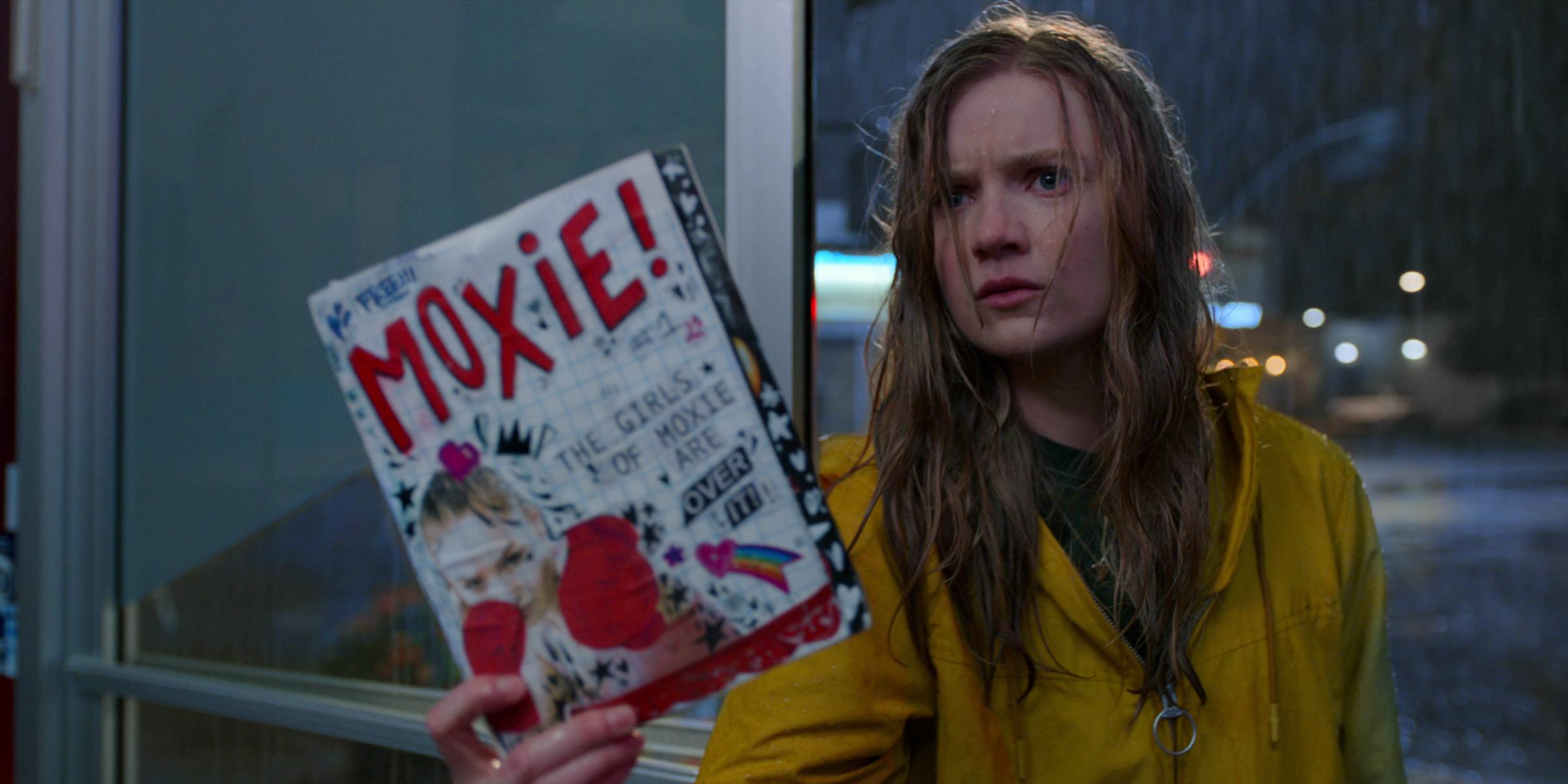Because time marches to its own backbeat, many riot grrrls are now riot moms, raising new generations of kids who have to invent their own rebellion. In Moxie—directed by Amy Poehler, who’s also one of the film’s stars—Vivian (Hadley Robinson), a newly minted 11th grader faced with the challenge of writing a college admissions essay, realizes she doesn’t have particularly passionate feelings about anything. “What do 16-year-olds care about?” she asks her mother, Lisa (Poehler), with schoolgirl earnestness. Lisa, who’s raising Vivian on her own, says that when she was 16, all she cared about was “smashing the patriarchy and burning it all down.” Then Vivian recalls parts of a song her mother used to sing to her, a line from Bikini Kill’s “Rebel Girl”—“That girl, she holds her head up so high”—and inspiration hits with the kerrrrang of a power chord. She drags out her mother’s battered old leather jacket, as well as an old suitcase filled with scrappy feminist ‘zines, and a second-generation riot grrrl is born.
For Vivian—radiant, kind, a little naïve—the style may come before the substance, but that’s partly how rock ’n’ roll works. Once she starts to think about it, she sees that there’s a lot to be angry about, even just within the walls of her school. She sees how the school’s arrogant, entitled football star, Mitchell (Patrick Schwarzenegger), simultaneously comes on to and bullies a class newcomer, Lucy (Alycia Pascual-Pena). His smirky condescension is pure sexist gaslighting, yet Vivian can’t yet see it for what it is. She urges Lucy to ignore him, noting that he’ll just move on to someone else, advice that Lucy, rightly, rails against. The guys at the school also have an elaborate rating system that they send around semi-surreptitiously at the beginning of each school year, sorting their female classmates into categories that include “Best Rack” and “Future MILF.” The school’s head, Principal Shelly (played by Marcia Gay Harden), turns a blind eye to the boys’ behavior, even when Lucy reports Mitchell for harassment. (She flutters nervously at the mere use of the word, knowing it will only make more work for her.)

As Vivian thinks more about what she sees at school, her slow walk toward radicalization speeds up. Inspired by Lisa’s collection of ‘zines, she makes her own—its name, inspired by one of Principal Shelly’s old-timey expressions, is Moxie!—and secretly leaves a stack in the girls’ bathroom. Before long, Vivian’s DIY enterprise has galvanized her female classmates. They’re frustrated, too; they just haven’t been able to find an outlet for their feelings. Vivian’s confidence grows, but if it comes with certain benefits (the attentions of a cute, considerate, skateboarding classmate, played by Nico Hiraga), it also carries some risks: her lifelong best friend, sweet, reticent Claudia (Lauren Tsai), not yet ready to be a radical, feels left behind.
Read more reviews by Stephanie Zacharek
As a YA parable about a young woman awakening from her comfortable obliviousness, and as a portrait of how teenage friendships shift, sometimes painfully, Moxie works relatively well—until the end. Vivian’s new, heightened consciousness comes with a dark side: It makes her a total pain in the ass, particularly at home, where Lisa—good, modern mom that she is—recognizes in her daughter the same strands of anger and frustration she once felt.
But the story leaves most of its most potentially interesting ideas on the table. Where’s the line between political radicalization and being a flexible, forgiving human being in the world? The movie relies far too heavily on slogans, stressing the importance of what we reflexively call “speaking your truth,” without recognizing that speaking out is a complex beginning, not a triumphant solution. Late in the game, almost as an afterthought, the movie introduces a rape subplot; instead of being addressed with the sensitivity it requires, this angle of the story exists only as a catalyst for a weirdly unrealistic, and far too facile, plot wrap-up. Then mom and daughter, having recently fought, wrap one another in a hug, each asserting how inspired she is by the other. Moxie kicks off as a shout-out to riot grrrl spirit, only to give us an ending written in the cursive script of an inspirational mug. The walk from being a ‘zine maker to a scrapbooker is apparently a short one.
More Must-Reads from TIME
- Donald Trump Is TIME's 2024 Person of the Year
- Why We Chose Trump as Person of the Year
- Is Intermittent Fasting Good or Bad for You?
- The 100 Must-Read Books of 2024
- The 20 Best Christmas TV Episodes
- Column: If Optimism Feels Ridiculous Now, Try Hope
- The Future of Climate Action Is Trade Policy
- Merle Bombardieri Is Helping People Make the Baby Decision
Contact us at letters@time.com